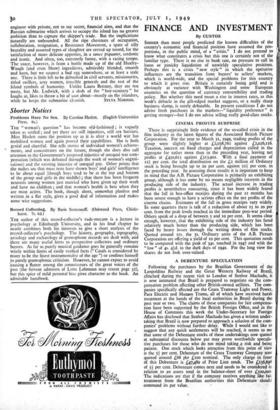FINANCE AND INVESTMENT
By CUSTOS
SOONER than most people predicted the known difficulties of the country's economic and financial position have assumed the pro- portions, in the public mind, of a "crisis." I do not pretend to know what constitutes a crisis but this one is certainly not of the familiar type. There is no rise in bank rate, no pressure to call in loans or panicky liquidation of unwieldy speculative positions. Perhaps this is a crisis "new style" in which the operative influences are the transition from buyers' to sellers' markets, which is world-wide, and the special problems for this country to which it gives rise. Britain is certainly losing gold and is obviously at variance with Washington and some European countries on the question of currency convertibility and trading policy. But whether this need mean a rise in interest rates, as this week's debacle in the gilt-edged market suggests, or a really sharp business slump, is surely debatable. In present conditions I do not advise fresh purchases in the markets—" liquidity preference " is getting stronger—but I do not advise selling really good-class stocks.
CINEMA PROFITS SURPRISE
There is surprisingly little evidence of the so-called crisis in the film industry in the latest figures of the Associated British Picture Corporation. For the year to March 31, 1949, trading profits of the group were slightly higher at £2,038,762 against £2,026,116. Taxation, interest on fixed charges and depreciation called in the aggregate for rather more than in the preceding year, leaving net profits at £450,613 against £513,901. With a final payment of 121 per cent. the total distribution on the £2 million of Ordinary stock is being brought up to 20 per cent. against 221 per cent. in the preceding year. In assessing these results it is important to keep in mind that the A.B. Picture Corporation is primarily an exhibiting group, although it has some by no means negligible interests in the producing side of the industry. The actual increase in trading profits is nevertheless reassuring, since it has been widely feared that the fall in box-office receipts during the past 12 months has been severe enough to have a serious effect on the net profits of the cinema chains. Estimates of the fall in gross receipts vary widely. In some quarters there is talk of a reduction of about 15 to 20 per cent. from the peak levels reached in the immediate post-war period. Others speak of a drop of between 5 and to per cent. It seems clear enough, however, that the exhibiting side of the industry has fared relatively much better than the producing side, which has been faced by heavy losses through the writing down of film stocks. Quoted around los. the 5s. Ordinary units of the A.B. Picture Corporation arc offering a yield of to per cent. This quotation needs to be compared with the peak of 34s. touched in 1947 and with the "low " of 4s. 41d. in the dark days of 1940. For the long view the shares do not look over-valued.
A DEBENTURE SPECULATION
Following the purchases by the Brazilian Government of the Leopoldina Railway and the Great Western Railway of Brazil, clinched during the recent visit to London of Senhor Machado, it is now intimated that Brazil is prepared to negotiate on the com- pensation problem affecting other British-owned utilities. The com- panies specifically affected arc the Ceara Tramway Light and Power,
Para Electric and Manaos Trams, all of which have received harsh treatment at the hands of the local authorities in Brazil during the past year or two. The claims of these companies for fair compensa- tion have been supported by the British Foreign Office, and in the House of Commons this week the Under-Secretary for Foreign Affairs has disclosed that Senhor Machado has given a written under- taking that Brazil is now prepared to approach a solution of the com- panies' problems without further delay. While I would not like to suggest that any quick settlements will be reached, it seems to me that some of the Debenture stocks of these undertakings now quoted at substantial discounts below par may prove worthwhile specula- tive purchases for those who do not mind taking .a risk and being patient. One stock which looks attractive from this point of view is the 51 per cent. Debenture of the Ceara Tramway Company now quoted around £68 rler £100 nominal. The only charge in front of this Debenture is £47,480 of Prior Lien stock. The £236,698 of 51 per cent. Debenture comes next and needs to be considered in relation to an assets total in the balance-sheet of over ,C500,00o The indications are that if the company receives anything like fair treatment from the Brazilian authorities this Debenture should command its par value.






































 Previous page
Previous page